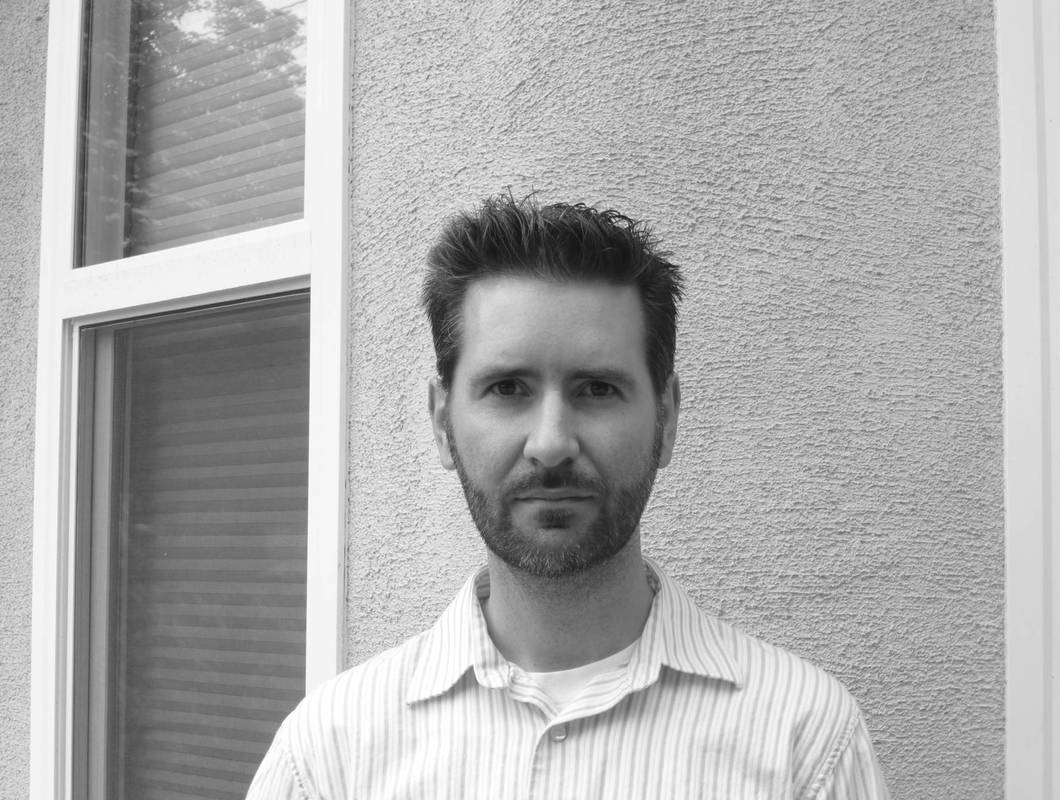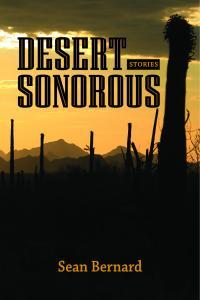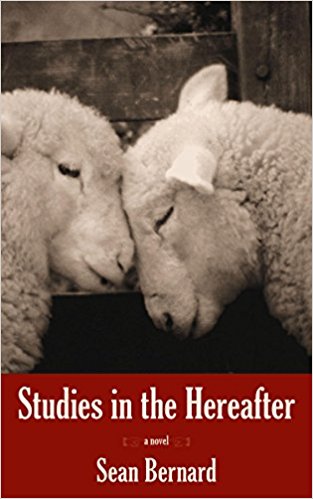Meet Sean Bernard
An interview with Visiting Fiction Writer Sean Bernard by Jodie Shull
Sean Bernard will be at Pasadena City College on September 19 at 3:30 pm in the Circadian Room for a reading and talk. The event is open to the public and is supported with a grant from the Pasadena Festival of Women Authors.
Award-winning fiction writer, Sean Bernard, serves as Director and Professor of Creative Writing at the University of La Verne, where he also edits the literary journal, Prism Review. Sean holds degrees in creative writing from the University of Arizona, Oregon State University, and the Iowa Writers’ Workshop. His fiction has appeared in numerous journals, including The Common, 7x7la, Flash Flash Click, Crazyhorse, Glimmer Train, West Branch, and The Gettysburg Review.
Sean’s debut novel, Studies in the Hereafter, was published in 2015 (Red Hen Press); his debut story collection, Desert sonorous, won the 2014 Juniper Prize and was published by the University of Massachusetts Press; and his chapbook, Nuclear, won the CutBank Books Novella Prize and was published in 2012. He has received artist-grants from groups in Washington, D.C., Arizona, Nevada, Oregon, as well as the 2010 Poets & Writers California Writers Exchange Award. In 2012, he received a fellowship from the National Endowment for the Arts.
Raised in Tucson, Arizona, Sean now lives in southern California with his wife, award-winning poet Genevieve Kaplan. Kaplan will also be a featured speaker at Pasadena City College this November. Learn more about Sean Bernard at his website: www.therealseanbernard.com.
Sean’s debut novel, Studies in the Hereafter, was published in 2015 (Red Hen Press); his debut story collection, Desert sonorous, won the 2014 Juniper Prize and was published by the University of Massachusetts Press; and his chapbook, Nuclear, won the CutBank Books Novella Prize and was published in 2012. He has received artist-grants from groups in Washington, D.C., Arizona, Nevada, Oregon, as well as the 2010 Poets & Writers California Writers Exchange Award. In 2012, he received a fellowship from the National Endowment for the Arts.
Raised in Tucson, Arizona, Sean now lives in southern California with his wife, award-winning poet Genevieve Kaplan. Kaplan will also be a featured speaker at Pasadena City College this November. Learn more about Sean Bernard at his website: www.therealseanbernard.com.
|
In August, 2017, Sean Bernard spoke with Inscape contributing editor Jodie Shull, via email, about his artistic development and his present writing and teaching practices: Jodie: You mention that you have been studying creative writing since you were eighteen. How did your interest in a writing career develop, did you have competing interests, and did you have to fend off any naysayers who thought you should become a doctor or a lawyer? Sean: I was always, always reading when I was younger – the kind of odd kid who, dragged to adult parties, would have a book under arm, so I could hide out in the corner and read. During summers, my mom would take me to the public library, and I’d check out twenty books every couple weeks – just devouring them. And I tried writing, too, from elementary school on – mostly (bad) mimicry of the stories I was reading. So reading and writing have been a part of my daily existence since well before I was ten years old. And since my great-uncle was an established author, it was a real and esteemed avenue; no one questioned my studying creative writing in college because he’d done so well in his own life as a writer. I was lucky to have him if not a frequent and direct presence in my life, then certainly an influential one, exerting strong gravitational pull. Jodie: As a graduate of the highly esteemed creative writing program at the University of Iowa, what were the three most valuable things you learned there? Sean: This one’s a little tricky for me – I don’t do a great job listing ‘lessons’ learned. So this is a weak stab: the most important craft lesson I learned was probably just how seriously good writers take writing. This is a lesson I continually forget and have to relearn, of course, but it’s a good one. I remember a professor physically pressing his fist against the table, pressing hard, pressing down, and wincing at the painful force he was exerting … and telling us that that was how much pressure we needed when making our own choices as writers, every sentence, every word. (I don’t think this lesson is always true – but it’s good to keep in mind. A nice arrow in the quiver of many.) Beyond that? I think I learned more human/humbling things: to be more generous with the work of others, certainly. To have more focus in my writing – and more generally in life. Jodie: Would you recommend creative writing classes even for students who are planning to become doctors or lawyers? Sean: I don’t know a lot of pre-med students with extra room in their schedules … but sure, absolutely, if a student likes to think in complex ways, to try to weave together multiple complex strands, if a student likes language, if a student feels strongly about existence and wants to create the same strength of feeling in others. Absolutely. Jodie: Do you have any favorite books on the craft of writing? Sean: Charles Baxter’s Burning Down the House is a good one, though it’s been years since I looked at it. Strunk & White is still pretty great, as I recall. I’m not great for this question, though; when I teach creative writing courses, I provide the craft lessons (and have the students provide their own craft lessons), rather than turning to a text. Jodie: As a creative writing teacher, what are the most common problems you see students struggle with as they work to improve their stories? Or, what are three ideas you would offer students who want to improve their stories? Sean: I’m reading this as a revision question; if I’m wrong, let me know. So much is learned, and learned so quickly, at the undergraduate level that I tend to deemphasize revision… it’s still part of the curriculum, but I feel (and students have agreed with me) that it’s often more beneficial to use everything you’ve learned in, say, the last six weeks on writing a *new* story … rather than going back to a previous draft of a previous story written without all that new knowledge. Students in my program do a great deal of revision at the end, though, as they work on a final thesis. The culprits to really effective and deep revision are the usual culprits when it comes to any work in life: sustained focus. Time and effort, those things. (Usually life is keeping the students from having as much time as they could use, so I don’t blame them.) Another thing, though, is having intent during the drafting process: if a student writes a short story without some sort of internal goal, it’s very, very difficult to give meaningful feedback on that story – at least with an eye toward revision, anyway: it’s always easier to improve toward an ultimate goal rather than general improvement in a vacuum. Short answer to the second question: having a clear sense of what you as a writer are trying to accomplish, be it tonal, or plot, whatever (not immediately … but not too far into the drafting process). And then: taking the time and energy needed to realize that vision. Jodie: What advice do you have for beginning writers about the balance between having confidence in their work and being open to suggestions for improving it? Is there a refuge from the pain of rejection that has worked for you in your writing career? Cover Photo from U of Mass Press 2017
Purchase the book here. |
Cover Photo from the author's website
Sean: I’ll answer these backward: rejection can still be frustrating, but it’s so commonplace, such a deep part of writing, that it rarely bothers me anymore (in terms of trying to get a work published, I mean). The joy of writing comes in writing, and it comes in reading, and it comes in celebrating the works of friends and other writers. So the refuge for me goes back very much to when I was a kid sitting in the corner at parties, reading a book; I was happy with the book, in my own little vacuum of literature. I didn’t need the recognition of others (it’s nice to get that, of course, but it often makes me more uncomfortable than rejection).
To the first question: my advice for beginning writers is to trust feedback from people who A) have your best interests at heart and have no motive for being competitive or anything like that and B) are well-read, thoughtful, attentive, kind, and generous and C) don’t pull punches and communicate *why* they give the type of critical feedback they do. Ideally, this is the type of readers one finds in a creative writing program – both in faculty and in peers. It’s what I try to create, culturally, so that all the students are in it for each other, and so they know I’m in it for them. If that’s the culture, the students really oughtn’t have issues getting critical feedback. Jodie: Can you share some information about your current writing projects? Sean: I’m working on a series of stories about a couple and their relatively brief but loving relationship. I’m on hiatus from a novel about observatories – or at least one that features observatories (and their heavenly associations) both literally and figuratively. Jodie: In your novel, Studies in the Hereafter, you create an afterlife and a cast of characters who live there. How did that idea develop and what were the best and worst aspects of trying to imagine that realm? Sean: That novel began as a romance between a Basque studies scholar and a Basque woman – or more, his attempts to get her to love him as much as he loved her. It felt slow, and so I added a character who was watching them, recording them; having someone watching something always – for me – adds a mysterious and even creepy air; it heightens what’s otherwise mundane. And when I asked myself who this person watching them happened to be, the angel idea jumped happily out … and so then I had to write the angel’s life, too, in all its (own mundane) glory. (“Re”)Imagining Heaven was fun. I didn’t want to add too many details, as there’s already such a strongly defined version of it in our western/Christian-influenced culture … but I did want to tweak some of the standard expectations. A little subversion is often fun. I tend toward the wry, or at least I try to. Jodie: Studies in the Hereafter is such a great vehicle for observations about writing, life, and humankind. Would you care to comment on any of these great quotes? “A good narrative is like life: an artful clutter.” Sean: ‘Artful’ being the key. But clutter, too: I’m suspicious of overly plotted novels. They feel written. I prefer literature that makes life feel sharper, and life is quite the clutter. “Keep the reader alert, wary, active—not passive.” Sean: Nodding. On listening to an author read his work: “I like to watch the human mind try to tell a tale….The touching needs of the teller. The reason he wants so badly to leave something behind.” Sean: Absolutely! I’m probably cribbing from Nabokov there: my favorite works are those that are so suggestive of the author behind the works … the individual mind, the emotions and feelings of that person. Not the story and not even the characters; the writer and what she or he is trying to communicate. And so I happen to very much like authors who write books that are quietly about writing (as Studies very much is): Calvino, Nabokov, Lucia Berlin, and Roberto Bolaño all come very quickly to mind. Things missing from the hereafter: “Showers, reading novels, and eating great food.” Sean: Life has to be better at least in some ways. And those three things rate high for me. On the hereafter: “Everything you could want—if you’re a person who doesn’t want for much.” Sean: That’s a nice snark from a snarky narrator. An angel speaking: “Mankind is the dumber version of us, our hapless younger siblings.” Sean: Seems about right, given the system of the novel; mankind can’t be quite as fully formed as the angels, as mankind hasn’t yet seen all there is to see. Jodie: Just for fun: If you were going to apply for a grant to do field research, what would you study? Sean: It really depends, but I did get some funds to do early research on observatories, which obviously is figuring into the project I mentioned earlier. I’m not sure *why* I got into telescopes/observatories, but I’m glad I did; it’s a rich well (seeing what’s far, missing what’s close; the temptation to draw lines between things that really aren’t related; the beauty of the night sky and all that hangs in). Hopefully the project will end up as a strong book. |
The Creative Writing program welcomes Sean Bernard to Pasadena City College on September 19, 2017, 3:30-5pm in Circadian Room on the PCC Campus, thanks to a generous grant from the Pasadena Festival of Women Authors (PFWA). Visit PasadenaFestivalOfWomenAuthors.org



